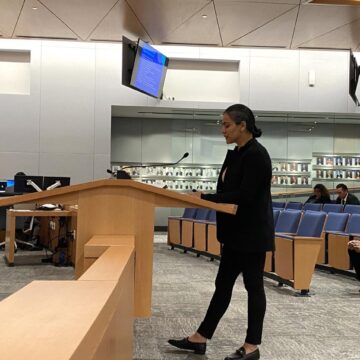A recall campaign against Bay Area state Sen. Aisha Wahab died yesterday due to a petition flaw leading to thousands of invalid signatures, proponents said.
The campaign needed at least 42,802 signatures by May 23 to be placed on the ballot, according to documents from the California Secretary of State — which campaign proponents said they had. But many of the petitions the state doled out were missing a signature line for signature gatherers, leading to missing signatures, a crucial component for the petitions to be valid.
Ritesh Tandon, principal of the recall campaign and former candidate for Congressional District 17 in the March primaries, said that mistake from the state was the campaign’s dying blow, invalidating roughly 30,000 signatures out of the more than 45,000 he said it gathered. To certify the affected petitions, the secretary of state told the campaign it would have to find the roughly 10,000 individuals who helped collect the signatures and ask them to sign the petition, which Tandon said was extremely difficult.
The campaign tried to get those signatures from those individuals, but eventually gave up between March and April, Tandon said.
“I feel very sad because this recall actually was by the common people when we were collecting signatures,” he told San José Spotlight. “We were all volunteers and it was going very good.”
Tandon, while working with a campaign professional, was told that the recall petitions were missing a signature line that needed to be signed by individual collectors. The campaign notified the secretary of state last February that the signature line was missing. The state acknowledged it was notified of the issue, but denied campaign a deadline extension to collect those signatures or waive the signature collector requirement, Tandon said.
A secretary of state spokesperson said the proponents were notified Feb. 20 they would have to get the signature collectors to sign at the bottom of the petition, even though Tandon said there was no signature line.
The government agency did not address how the error happened.
The recall efforts against Wahab — who represents District 10, including parts of Santa Clara and Alameda counties — began last December and were largely spurred by opposition to Senate Bill 403, a first-of-its-kind caste discrimination bill. Gov. Gavin Newsom vetoed that bill last October.
The campaign has expanded since then to include opposition to other efforts Wahab has introduced, including SB 460 which would have prohibited landlords from asking about a prospective tenant’s criminal background, but failed in February, according to Legiscan.
Wahab said this campaign has unsuccessfully tried to recall her multiple times, which she called disappointing.
“I think it’s a waste of time, money and effort and a distraction from the legitimate issues that we are genuinely focused on (to) help Californians,” she told San José Spotlight. “The reality is that we all have a job to do and they may not be happy with everything that has taken place based on that civil rights caste bill, but at a certain point we need to kind of move on.”
Wahab, a Fremont native, was elected in 2022 as the first Muslim, Afghan American elected to the state Legislature. Wahab previously served on the Hayward City Council.
Tandon, who ran for Congressional District 17 in 2020 and 2022, said he won’t quit the recall efforts. He already plans to lead another recall effort and said this time he’ll run it with the help of professionals to avoid any pitfalls.
He said Wahab does not represent the people and will continue to demand her recall.
“Do your job. If the people have trusted you, then be a people representative and work for them, not for the special interest,” he said.





